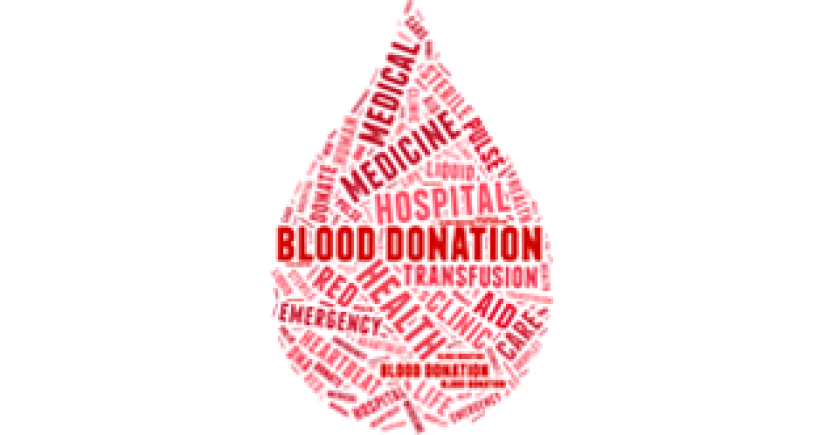
Support Specialties
Donate Blood, Donate Life
Donate Blood, Donate Life Jul 24, 2014
 There is someone who needs blood every two seconds in our country. A single donation from you can save more lives than one
On June 14, we all celebrated ‘World Blood Donor Day’. The event is aimed at creating awareness on the importance of blood donation, to recognise the contribution of voluntary unpaid blood donors in saving millions of lives and improving their health. The other purpose for celebration is to create wider awareness throughout the world about the need for availability and appropriate use of safe blood and blood products.
Of the 107 million blood donations collected globally, more than half of these were collected in high income and developed countries, which is home to less than 15 per cent of world population. Timely availability of safe blood and blood products is required to save life in many conditions such as severe road accidents, complications arising from pregnancy and child delivery, childhood anaemia, various blood disorders,treatment of cancers along with performing complicated and advanced surgeries.
Scenario in India
In India, the demand for blood and blood products is much more than we are currently able to meet. We are unable to meet even 50 per cent of our requirement. Many patients die or suffer due to lack of timely availability of safe blood and blood products.
Like many under-developed and developing countries, we have three categories of blood donors:
• The first, the safest and the best category is voluntary, non-remunerated donors who are motivated by altruism and the desire to help others and feel a sense of moral duty or social responsibility.
• The second category of donors are called replacement donors who are close family members and friends of patients and are forced or under pressure to donate blood for patients as blood banks do not have adequate supply of required blood and blood products.
• The third category of donors is called paid or professional donors who donate blood for money. What is required in India for self-sufficiency in blood and blood products is recruitment and retention of healthy voluntary blood donors.
Who can be a blood donor?
Anyone who is healthy, between the 18 and 65 years of age, weighs more than 45 kg and has haemoglobin (Hgb) level more than 12.5 gm/100 ml can be a donor. People with well-controlled diabetes and insulin independent, well controlled benign thyroid disorders or hypertension can also donate blood. One should not have chronic blood borne infections such as Hepatitis, HIV, etc. which are transmitted through blood. A healthy male can donate every 12 weeks and a female every 16 weeks. Blood donation is harmless. The blood bank’s first responsibility is to ensure that the donor is healthy and blood donation does no harm to him/her in any way and that donated blood is safe for patients. Donor can perform his/her routine activities after the donation. One donated unit of blood can save the life of more than one person as the donated blood is divided into different components and only the required component is infused to the patient.
Where can you donate blood?
All major hospitals, both private and government, have blood banks and welcome blood donors.so that they can treat people with blood disorders and other illnesses. Fortis Hospital Vasant Kunj (FHVK) has a neat, tidy and spacious blood bank with all modern facilities. It is manned by experienced and well-trained doctors, technicians, nurses and counsellor.
Timely availability of safe blood and blood products is required to save life in many conditions such as severe road accidents, complications arising from pregnancy and child delivery, childhood anaemia, different blood disorders etc.
There is someone who needs blood every two seconds in our country. A single donation from you can save more lives than one
On June 14, we all celebrated ‘World Blood Donor Day’. The event is aimed at creating awareness on the importance of blood donation, to recognise the contribution of voluntary unpaid blood donors in saving millions of lives and improving their health. The other purpose for celebration is to create wider awareness throughout the world about the need for availability and appropriate use of safe blood and blood products.
Of the 107 million blood donations collected globally, more than half of these were collected in high income and developed countries, which is home to less than 15 per cent of world population. Timely availability of safe blood and blood products is required to save life in many conditions such as severe road accidents, complications arising from pregnancy and child delivery, childhood anaemia, various blood disorders,treatment of cancers along with performing complicated and advanced surgeries.
Scenario in India
In India, the demand for blood and blood products is much more than we are currently able to meet. We are unable to meet even 50 per cent of our requirement. Many patients die or suffer due to lack of timely availability of safe blood and blood products.
Like many under-developed and developing countries, we have three categories of blood donors:
• The first, the safest and the best category is voluntary, non-remunerated donors who are motivated by altruism and the desire to help others and feel a sense of moral duty or social responsibility.
• The second category of donors are called replacement donors who are close family members and friends of patients and are forced or under pressure to donate blood for patients as blood banks do not have adequate supply of required blood and blood products.
• The third category of donors is called paid or professional donors who donate blood for money. What is required in India for self-sufficiency in blood and blood products is recruitment and retention of healthy voluntary blood donors.
Who can be a blood donor?
Anyone who is healthy, between the 18 and 65 years of age, weighs more than 45 kg and has haemoglobin (Hgb) level more than 12.5 gm/100 ml can be a donor. People with well-controlled diabetes and insulin independent, well controlled benign thyroid disorders or hypertension can also donate blood. One should not have chronic blood borne infections such as Hepatitis, HIV, etc. which are transmitted through blood. A healthy male can donate every 12 weeks and a female every 16 weeks. Blood donation is harmless. The blood bank’s first responsibility is to ensure that the donor is healthy and blood donation does no harm to him/her in any way and that donated blood is safe for patients. Donor can perform his/her routine activities after the donation. One donated unit of blood can save the life of more than one person as the donated blood is divided into different components and only the required component is infused to the patient.
Where can you donate blood?
All major hospitals, both private and government, have blood banks and welcome blood donors.so that they can treat people with blood disorders and other illnesses. Fortis Hospital Vasant Kunj (FHVK) has a neat, tidy and spacious blood bank with all modern facilities. It is manned by experienced and well-trained doctors, technicians, nurses and counsellor.
Timely availability of safe blood and blood products is required to save life in many conditions such as severe road accidents, complications arising from pregnancy and child delivery, childhood anaemia, different blood disorders etc. 


















